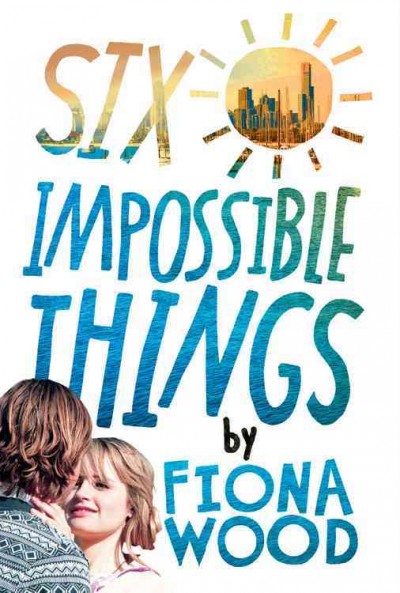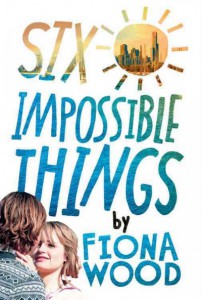Six Reasons You’ll Want to Read
Six Impossible Things by Fiona Wood
- The cast of characters is interesting: Dan Cereill (pronounced surreal) is nearly 15 when misery throws a sucker punch: the family business goes bankrupt, his dad proclaims he’s gay and moving out, and the comfortable life the Cereills knew, disappears. After these life-changing shocks, Dan and his mother move into the deceased, great-aunt Adelaide’s historic, Victorian home. According to Dan, it’s the sort of place you’d see in a horror film—complete with grim gargoyles, an attic, and poor heating. But it is next door to Estelle, the unattainable beauty who plays the cello and who actually has a lot in common with Dan. Thinking about Estelle becomes Dan’s brain’s screen saver in a life where “everything feels so relentless and impossible. It’s like trying to run with no traction. There’s no one to depend on, no one solving problems, no one picking up the tab, [and] no one to pass the buck to” (161).
- Given the dire state of the family’s financial affairs, Dan can no longer attend the private school where he has established friendships and found a niche with other “odd socks.” But the move might give him a chance to reshape his image. Dan envisions a shot at a fresh start, peeling off the old labels—shy, uncool, nerd—and flicking them away. As he navigates the new-school challenges, the reader is reminded of the niche-picking phase that adolescents endure. We also revisit the social hierarchy of high school, the first “real job” woes, first kiss anxiety, and parent-child conflicts. We’re reminded how the ebullience of adolescence is weighed down with differing perspectives: “I just hate how we’re supposed to be so independent and show initiative, but only on their terms. The minute you really show some initiative they just want to squash you back into the kid-shaped box” (188).
- In an attempt to manage his problems, Dan makes lists—reminding the reader of the therapeutic power of such lists. Dan lists goals and hopes; he inventories can’ts, catalogues his life, and works through his internal conflicts—not the least of which are his feelings regarding his father. Dan has jammed memories of his dad in a box he won’t open. As Dan revises and revisits the lists, we learn explicit advice—that things have a way of working out regardless of how impossible current events might present themselves—as well as implied truths—we cannot own what we do not control. After all, someone else’s feeling are beyond our power to change.
- The line, “There’s this sky she likes” (13), plays a surprising and clever double meaning in the book.
- Despite the occasional stereotype—the intimidation and bullying of Jason Doyle, aka Jayzo, the plot presents a male perspective and does considerable myth-busting as it provides honest enlightenment about male emotions and friendships. Another odd sock, “bespectacled, bepimpled, smiling” (17) Fred is a loyal friend, and Oliver is “like a miracle—a kind of hip older-brother fairy godmother style guru hybrid” (223). All three actually help Dan during this awkward transitional phase; if it weren’t for Jayzo’s bullying, Dan would not have had the motivation to do something about his indiscernible abs.
- One of the most interesting characters in Wood’s book is Howard, Adelaide’s dog. With a peculiar ability to understand human speech and behavior, enigmatic Howard has a psychotherapist’s look and an all-knowing air about him. As a sounding board for Dan’s emotional and mental turmoil, Howard plays a key role in helping Dan heal.


